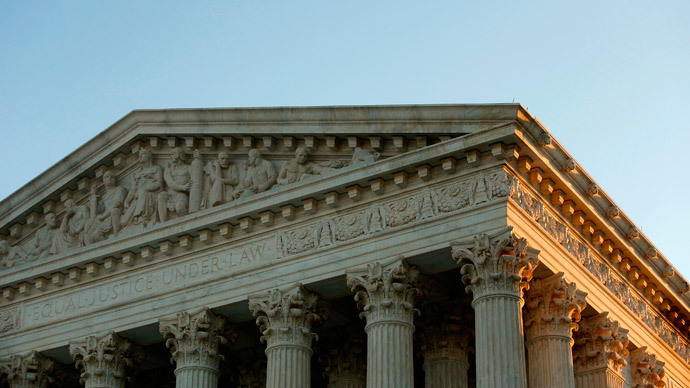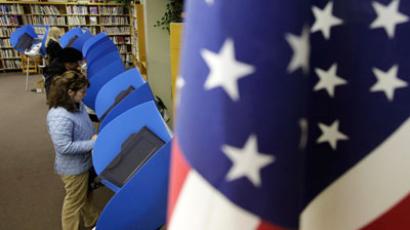Wisconsin's tough voter ID law upheld after Supreme Court declines to hear case

The Supreme Court declined to review a challenge to a Wisconsin law requiring voters to present photo identification at polling places. As a result, the federal appeals court ruling that the state may proceed with voter ID requirements was upheld.
On Monday, the Supreme Court denied a request to hear the case Frank v. Walker without explanation. The suit, filed by the American Civil Liberties Union (ACLU) on behalf of Ruthelle Frank and Eddie Lee Holloway Jr., claimed that the state’s voter ID law is unconstitutional and will deprive citizens of the right to vote. On April 29, 2014, the district court struck down Wisconsin’s voter ID law, but on October 6, a divided appellate court reversed the ruling.
“The Supreme Court’s decision is a huge step backward for our democracy,” Advancement Project Co-Director Penda D. Hair said in a statement Monday. “The 300,000 registered Wisconsin voters who lack the limited forms of photo ID needed to vote in Wisconsin ‒ disproportionately African Americans and Latinos ‒ deserve to have their voices heard in our political process.”
“The values enshrined in our Constitution, and protected in the Voting Rights Act, are undermined when burdensome laws like photo ID requirements make the ballot box inaccessible to any eligible voters,” Hair continued. “Our elections should always be free, fair and accessible to all citizens. Under Wisconsin’s restrictive photo ID law, they simply are not.”
The ACLU claimed, based on research the group commissioned, that the law has a disproportionate impact on Black and Latino voters, who are more likely to lack photo ID accepted for voting in Wisconsin. Elderly voters, like Frank and Holloway, are also disenfranchised by the law.
READ MORE: Virginia, Maryland plagued with 44k duplicate voters
Frank was born in her home in Brokaw, Wisconsin in 1927, and does not have a certified copy of her birth certificate, which precludes her from obtaining an accepted form of ID under the state’s law. The Wisconsin Register of Deeds has a record of her birth and can produce a certified copy of her birth certificate, but at a cost. The record on file, however, has an incorrect spelling of her maiden name: Wedepohl, and is consequently an unacceptable form of identification. It could cost Frank more than $200 to correct the mistakes, the ACLU said.
Holloway is unable to get a driver’s license because his birth certificate incorrectly lists his name as "Eddie Junior Holloway," due to a decades-old clerical error. His Social Security Card and an expired Illinois photo ID ‒ both bearing the name "Eddie L Holloway Jr" ‒ do not qualify him to obtain an acceptable form of ID in Wisconsin. He is currently severely disabled, unemployed and homeless, and cannot afford to rectify the situation, according to the civil rights group.
Although the Supreme Court’s non-action allows the state’s voter ID law to go into effect immediately, it won’t go into effect until after the April 7 elections in Wisconsin. Voting is currently underway in the state for school board, municipal and Wisconsin Supreme Court positions.
"Absentee ballots are already in the hands of voters, therefore, the law cannot be implemented for the April 7 election," the state's attorney general, Brad Schimel, said in a statement issued shortly after the Supreme Court's announcement. "The Voter ID law will be in place for future elections ‒ this decision is final."
The ACLU said the state’s decision not to implement the law immediately was a relief.
"We're pleased the state has agreed with the ACLU's position that imposing a new restriction on voters in the midst of an election is a recipe for disaster," Dale Ho, the director of the ACLU’s Voting Rights Project, said in a statement. "For now, the voters of Wisconsin will be able to cast their ballots free from the burdens placed on them by this law. But this should be the case for voters permanently, not just for one election."
The civil rights group is now weighing its options, as the Supreme Court’s refusal to hear the case merely allows the federal appeals court ruling upholding the law to stand, Ho told NPR.
"It doesn't preclude future challenges to that law on the basis of other legal theories, or challenges to particular aspects of the law," Ho told NPR. He noted, for example, that Veterans Administration identification cards, which include photos, are not allowed as acceptable forms of voter ID in Wisconsin ‒ indicating that might be one possible avenue for challenge.
READ MORE: Veteran denied voting rights over lack of ID
"This is just one more development in the ongoing debate about voter identification, but it is by no means the last word," Ho said. "The Supreme Court didn't say that Wisconsin's voter ID law was constitutional or unconstitutional. It just declined to take the case, which means that it's still an open question in the US Supreme Court whether or not these kinds of very strict ID laws violate federal law."
The ACLU may also focus its efforts on North Carolina and Texas, where federal court cases are pending. In August 2013, the Justice Department sued Texas over its voter ID law, after the state began mandating photo ID cards inside of polling places. A month later, the DOJ similarly sued North Carolina over its law, which requires photo IDs in 2016; the case is scheduled for this summer.
Both states passed restrictive voter ID laws after the Supreme Court voted 5-4 to gut Section 4 of the 1965 Voting Rights Act in 2013. That part of the law explained the formula used by Congress to identify regions of the US subject to extra scrutiny when local lawmakers try to change election rules. Section 4 was the precursor to Section 5, which gives the federal government the power to “preclear” any state or local changes in election rules that could potentially prevent minorities from voting.














